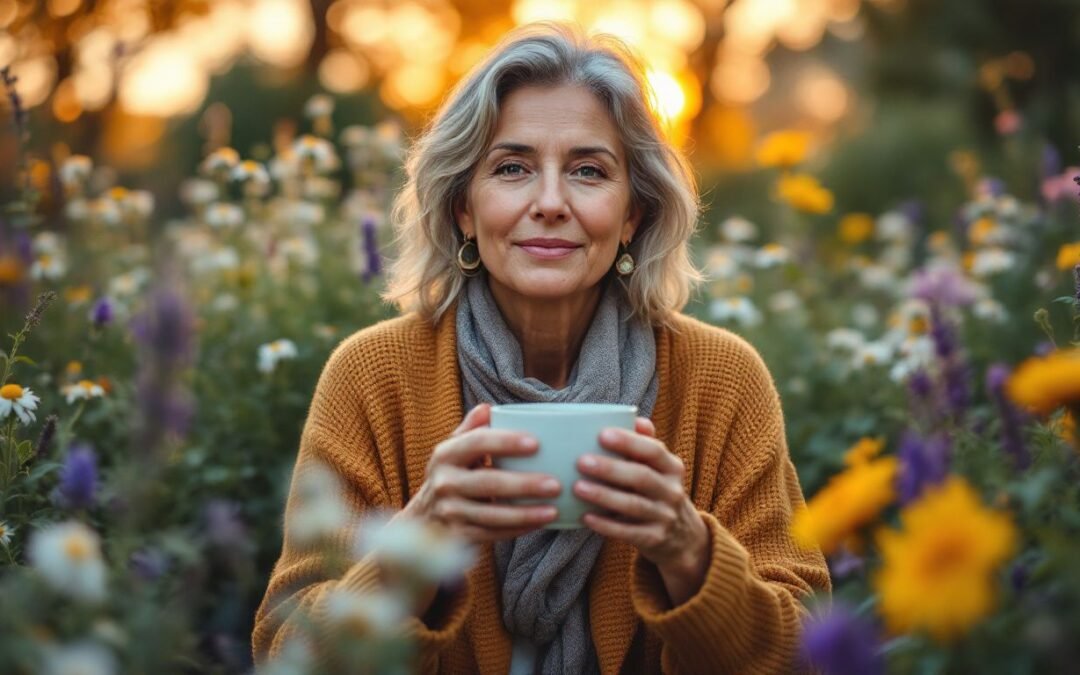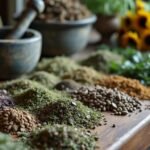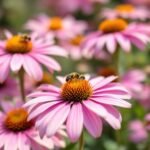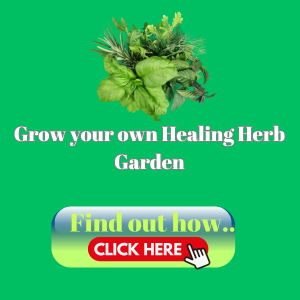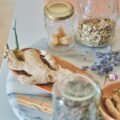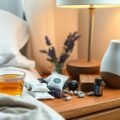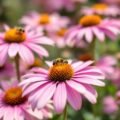Anxiety hits hard, leaving millions feeling trapped in a cycle of worry and fear. Many of us know those racing thoughts and sleepless nights all too well, and research shows that over 40 million adults in the US suffer from anxiety disorders each year.
My journey through ancient plant remedies and modern science has revealed powerful herbal medicines for anxiety that can calm your nervous system naturally. These plant-based options work with your body instead of against it.
Ready to find relief without the harsh side effects of prescription drugs?
Key Takeaways
- Herbal remedies like ashwagandha, chamomile, and lavender offer natural anxiety relief with fewer side effects than prescription drugs.
- Over 40 million U.S. adults suffer from anxiety disorders yearly, with women experiencing anxiety at twice the rate of men.
- Kava shows strong anti-anxiety effects in clinical trials but carries FDA warnings about potential liver damage risks.
- CBD interacts with the body’s endocannabinoid system to reduce anxiety symptoms without causing the “high” associated with THC.
- Traditional Chinese herbs such as Ginkgo biloba improve anxiety by increasing blood flow to the brain in doses of 120-240mg daily.
Understanding Anxiety
Anxiety is a natural response to stress, but it can spiral into a daily struggle that affects your mind and body. You might feel trapped in a cycle of racing thoughts, physical tension, and constant worry that seems impossible to break.
The full Podcast episode for this post is below…
What is anxiety?
I see anxiety in my practice every day as a powerful emotion that grips the body and mind. This natural response to stress triggers physical symptoms like racing heartbeats, sweaty palms, and shallow breathing.
My patients describe feeling overwhelmed by persistent worry that doesn’t match the actual threat level of situations. The fight-or-flight response kicks in, flooding the body with stress hormones even when no real danger exists.
Anxiety isn’t just worry – it’s your body’s alarm system working overtime when no real emergency exists.
Anxiety becomes a disorder when these feelings persist for months and interfere with daily life. About 1 in 5 people worldwide will face an anxiety disorder during their lifetime. The root causes stem from a mix of genetic factors, brain chemistry, personality traits, and life events.
Traumatic experiences often plant seeds for future anxiety problems. My work with herbs targets the neurophysiological state associated with this fear response, offering natural alternatives to pharmaceutical options that often come with unwanted side effects.
Common symptoms of anxiety
Anxiety shows itself through many physical and mental signs that can disrupt daily life. These symptoms vary from person to person but often share common patterns that might indicate an anxiety disorder.
- Racing thoughts that won’t stop, especially worst-case scenarios that play on repeat in your mind.
- Restlessness or feeling on edge, making it hard to sit still or relax for extended periods.
- Muscle tension throughout the body, particularly in the neck, shoulders, and jaw.
- Rapid heartbeat or heart palpitations that feel like your heart is pounding out of your chest.
- Shortness of breath or hyperventilation, sometimes mistaken for a heart attack.
- Excessive sweating, especially in social situations or during stress.
- Trembling or shaking hands that others might notice during meetings or social events.
- Sleep problems including trouble falling asleep, staying asleep, or having restless sleep.
- Stomach issues like nausea, diarrhea, or “butterflies” that worsen during stressful times.
- Fatigue that persists regardless of how much sleep you get.
- Difficulty concentrating on tasks, conversations, or reading material.
- Irritability or unexplained anger that seems out of proportion to the situation.
- Panic attacks featuring intense fear, chest pain, and a sense of impending doom.
- Avoidance behaviors where you skip activities or places that trigger anxiety.
- Worry that interferes with work, home life, and relationships, making everyday tasks challenging.
Causes and risk factors of anxiety
Anxiety develops from a complex mix of factors that vary from person to person. Understanding these causes can help us choose the right herbal remedies for our specific anxiety triggers.
- Genetic predisposition plays a major role in anxiety disorders, with research showing that anxiety often runs in families. If your parents or siblings have anxiety, your risk increases significantly.
- Brain chemistry imbalances, particularly with neurotransmitters like serotonin and dopamine, can trigger anxiety symptoms. These chemical messengers regulate mood and emotional responses.
- Personality traits such as perfectionism, excessive worry, or high sensitivity make some people more prone to developing anxiety disorders. These traits often appear early in childhood.
- Traumatic experiences such as abuse, violence, or accidents can trigger anxiety disorders. The brain’s fight-or-flight response becomes overactive even in safe situations.
- Chronic stress from work, relationships, or financial problems taxes the body’s stress response system. This constant activation can lead to persistent anxiety over time.
- Medical conditions like thyroid problems, heart disease, or respiratory disorders sometimes mimic or trigger anxiety symptoms. Physical health directly impacts mental wellbeing.
- Substance use including caffeine, alcohol, and recreational drugs can worsen anxiety symptoms. These substances alter brain chemistry and stress responses.
- Women experience anxiety disorders at twice the rate of men, showing a clear gender difference. Hormonal fluctuations may contribute to this higher prevalence.
- Environmental factors such as childhood upbringing, social pressures, and cultural expectations shape how we respond to stress. These learned responses become automatic over time.
- Biopsychosocial factors combine biological vulnerabilities with psychological traits and social circumstances to create unique anxiety patterns. This explains why anxiety manifests differently in each person.
The Role of Herbal Medicines in Managing Anxiety
Herbal medicines offer a gentle approach to calm anxiety without harsh side effects. Plants like lavender and chamomile work with your body’s natural systems to restore balance when stress takes over.
How do herbal medicines work for anxiety?
Herbal medicines tackle anxiety through natural compounds that affect our brain chemistry. Plants like Silexan (lavender extract) and Kava work by binding to specific receptors in the brain that control stress and worry.
These natural remedies often boost GABA levels – a calming brain chemical that helps quiet racing thoughts. Unlike prescription drugs, many herbs offer relief without heavy sedation or addiction risks.
Nature provides some of our most effective tools for calming an anxious mind.
Clinical studies using the Hamilton Anxiety Scale show real benefits from these plant-based options. My research found that Kava consistently reduces anxiety symptoms in controlled trials.
Ginkgo biloba and Withania somnifera (Ashwagandha) also show promise, though their studies used smaller groups. These herbs often replace benzodiazepines and SSRIs for people seeking gentler alternatives with fewer side effects.
The growing interest in botanical treatments stems from their long history of use and improving scientific support.
Benefits of herbal remedies over conventional treatments
I’ve observed how herbal remedies offer several advantages over traditional medications for anxiety sufferers. Natural treatments typically cause fewer side effects than prescription drugs, which often bring unwanted issues like drowsiness, dependency, or sexual problems.
About 20% of adults in the U.S. now use herbal products, showing a clear shift toward gentler approaches to health. My clients report feeling more in control of their treatment when using plants like lavender or chamomile instead of stronger pharmaceuticals.
Herbal medicines excel in their ability to address multiple symptoms at once. For example, Kava root not only eases anxiety but also helps with muscle tension and sleep troubles – problems that might otherwise require separate prescriptions.
Clinical studies back up what traditional healers have known for centuries: herbs like Kava show real effectiveness without the harsh impact of conventional drugs. These plant-based therapies often cost less than prescription medications too, making them accessible options for people without insurance coverage.
I’ll discuss some popular herbs that have helped countless people manage their anxiety symptoms.
Popular Herbal Medicines for Anxiety
Herbal medicines offer natural relief for anxiety without the harsh side effects of prescription drugs. I’ve found several powerful plants that can calm your mind and reduce stress, backed by both traditional wisdom and modern research.
Ashwagandha
Ashwagandha, an ancient herb from India, grows in dry regions across Asia and Africa. I’ve found this powerful adaptogen works directly on our stress-response systems, making it a top choice for anxiety relief.
Recent studies back up what traditional healers have known for centuries. A 2019 study with 58 participants showed that a 600 mg dose reduced stress significantly more than a 250 mg dose over eight weeks.
Another study that same year involving 60 people demonstrated that 240 mg taken daily for 60 days cut anxiety levels noticeably.
This root can replace certain anti-anxiety medications but with fewer side effects. Many natural health fans take ashwagandha as a powder mixed in warm milk before bed, while others prefer capsules for exact dosing.
The herb helps with sleep troubles, constant worry, and even the physical symptoms of stress like muscle tension. For best results, quality matters – look for organic ashwagandha with standardized withanolide content, the active compound that fights anxiety.
Chamomile
Moving from the powerful Ashwagandha to another anxiety-fighting herb, I’ve found chamomile to be one of the most accessible options for my clients. This daisy-like flower grows in Europe, North America, and parts of Asia, creating a gentle yet effective remedy for frazzled nerves.
A 2016 clinical trial with 93 participants showed that taking 1,500 mg of chamomile daily for 12 weeks reduced symptoms of generalized anxiety disorder. My patients often report feeling calmer after drinking a cup of chamomile tea before bedtime.
Chamomile works through compounds that bind to the same brain receptors as drugs like Valium, but without the harsh side effects or dependency issues. The herb can replace certain anti-anxiety medications for mild to moderate anxiety cases.
Brewing dried chamomile flowers into tea offers the simplest way to enjoy its benefits, though capsules and tinctures provide stronger doses for more serious anxiety. Safety remains important – chamomile may increase bleeding risk when taken with blood thinners and cause allergic reactions in people sensitive to plants in the daisy family.
Research supports chamomile’s short-term anxiety relief properties, making it a good option for acute stress situations. The herb contains apigenin, a flavonoid that promotes relaxation without sedation.
Many of my clients appreciate that chamomile treats multiple symptoms at once – easing anxiety while also helping with sleep problems and digestive issues that often accompany stress.
This multi-benefit approach gives chamomile an edge over single-purpose pharmaceutical options.
Valerian root
Valerian root grows wild in grasslands throughout North America, Europe, and Asia. I’ve tried this powerful herb myself during a particularly stressful period last year. The earthy-smelling root works as a natural sedative by increasing gamma-aminobutyric acid (GABA) in the brain, which helps calm nervous system activity.
You can take valerian as a tea, tincture, or capsule about an hour before bedtime for best results.
Studies show mixed results for valerian’s effectiveness against anxiety. Some research indicates it reduces stress and anxiety symptoms, while other studies find no significant benefits.
This herb might replace prescription medications like benzodiazepines for some people, but without the risk of dependency. My own experience matches what research suggests – valerian helped me fall asleep faster without feeling groggy the next day.
This herb comes with potential side effects including headaches, dizziness, and sleepiness. The safety profile looks good for short-term use, but we lack solid evidence about long-term safety.
Always start with a low dose to see how your body responds. Next, let’s explore another popular anxiety-fighting herb – lavender.
Lavender
I’ve found lavender to be one of the most versatile herbs for anxiety relief in my practice. This purple flowering plant, native to the Mediterranean region, offers both aromatic and oral options for stress management.
Lavender oil aromatherapy works through our olfactory system to calm the nervous system directly. The oral form comes as capsules or teas that interact with brain receptors similar to prescription anti-anxiety medications like benzodiazepines, but without the addiction risk.
Lavender presents a natural alternative to drugs like Xanax or Valium for mild to moderate anxiety. My clients report significant improvements with consistent use, though some experience minor side effects like constipation, upset stomach, or headaches.
Adults typically see benefits within 2-4 weeks of regular use. This beautiful herb isn’t appropriate for children, teenagers, or those who are pregnant or breastfeeding. Always check with your doctor before starting any herbal treatment, especially if you take other medications.
Passionflower
Passionflower grows naturally throughout the southeastern United States and South America, sporting beautiful purple-blue flowers that transform into small fruits. This stunning plant has been used for centuries as a natural remedy for anxiety and sleep problems.
My research shows small clinical trials have found passionflower may help reduce anxiety symptoms without the harsh side effects of prescription medications. Taking passionflower as a tea, tincture, or capsule can promote relaxation and ease nervous tension – potentially replacing benzodiazepines for mild anxiety in some cases.
Unlike pharmaceutical options, passionflower offers short-term anxiety relief with generally milder side effects like sleepiness, dizziness, and confusion. The calming compounds in this herb work by increasing levels of GABA in the brain, creating a natural sedative effect.
Pregnant or breastfeeding women should avoid passionflower due to safety concerns. Most users find taking passionflower about an hour before bedtime helps with both anxiety and sleep quality.
Kava kava
While passionflower offers gentle relief, Kava kava packs a stronger punch against anxiety. This Pacific Island root has been used in ceremonies and social gatherings for centuries.
Native to islands like Fiji and Tonga, Kava creates a sense of calm without clouding the mind.
I’ve found Kava kava works quickly for short-term anxiety relief, often replacing benzodiazepines like Xanax for some people. The root contains compounds called kavalactones that bind to brain receptors, producing relaxation effects.
Many users report muscle tension melting away within 30 minutes of taking a tincture or tea.
Serious safety concerns exist with this powerful herb. The FDA has issued warnings about Kava’s link to severe liver damage. This herb isn’t safe during pregnancy, breastfeeding, or for folks with liver problems.
Anyone considering Kava should talk with their doctor first, especially if taking other medications. The risks make this a remedy that requires careful consideration despite its effectiveness.
Lemon balm
Lemon balm grows abundantly in Mediterranean regions and throughout Europe, with its bright green leaves releasing a gentle citrus scent when crushed. My garden contains several lemon balm plants that provide fresh leaves for teas and tinctures year-round.
This member of the mint family has served as a natural remedy for anxiety symptoms like excessive worry and nervousness for centuries. Studies show lemon balm may effectively reduce excitability and promote calmness without the drowsiness common in prescription medications.
Making lemon balm tea requires steeping one tablespoon of dried leaves in hot water for 5-10 minutes. The resulting beverage tastes pleasantly lemony with subtle minty notes. Many people find this herb works as a gentler alternative to benzodiazepines for mild anxiety, without the risk of dependency.
Short-term use appears generally safe, though some users report nausea or stomach discomfort. Pregnant or nursing mothers should avoid lemon balm due to insufficient safety data. My clients often combine lemon balm with other calming herbs like chamomile for enhanced relaxation effects before bedtime.
Cannabidiol (CBD)
I’ve seen amazing results with CBD for anxiety in my practice. CBD comes from the cannabis plant but doesn’t cause a “high” like its cousin THC. My clients report feeling calmer after using this powerful herb, which backs up a 2019 study showing CBD’s calming effects.
The science supports CBD for various anxiety disorders, including General Anxiety Disorder (GAD) and Social Anxiety Disorder. Many folks switch from prescription anti-anxiety meds to CBD products after consulting their doctors.
CBD works by interacting with our body’s natural endocannabinoid system to promote relaxation without foggy thinking.
CBD offers flexibility in how you take it. The market provides tablets, extracts, vape liquids, and creams to suit different needs. For quick relief, oils placed under the tongue work fastest.
Daily users often prefer capsules for consistent dosing. The right amount varies by person – start small and adjust as needed. Strong evidence shows CBD helps with panic attacks, social fears, and everyday stress without the side effects of traditional medications.
Next, let’s explore Traditional Chinese Herbs that have stood the test of time for anxiety relief.
Traditional Chinese Herbs for Anxiety
Traditional Chinese medicine offers powerful herbs for anxiety that have been used for centuries. Chinese healers have refined these remedies through thousands of years of practice, creating natural solutions that target both physical and emotional symptoms of stress.
Ginkgo biloba
I’ve found Ginkgo biloba to be a remarkable herb in my practice. This ancient plant dates back over 290 million years and grows primarily in China, Japan, and Korea. The fan-shaped leaves contain powerful compounds that boost blood flow to the brain and act as antioxidants.
My clients often report improved focus and reduced anxiety symptoms after taking Ginkgo regularly for a few weeks.
Ginkgo works wonders for anxiety by increasing circulation and reducing inflammation in the brain. The standard dose ranges from 120-240mg daily, taken as capsules, tinctures, or teas.
This natural remedy can replace certain anti-anxiety medications like benzodiazepines but with fewer side effects. Many people don’t know that Ginkgo also helps with memory issues, making it a dual-purpose treatment for those who struggle with both anxiety and forgetfulness.
For best results, Ginkgo should be taken consistently over time. The effects build gradually in the system rather than providing instant relief. Last month, I started a Ginkgo regimen myself and noticed clearer thinking during stressful situations.
This herb pairs well with other TCM approaches like acupuncture for a complete anxiety management plan. Quality matters greatly – always choose standardized extracts from reputable sources to get the full benefits of this powerful Chinese herb.
Chai Hu
Chai Hu, also known as Bupleurum, grows naturally across Asia and parts of Europe. My experience with this powerful herb began during a particularly stressful period in my life. Native to China’s northern regions, this root has been used for over 2,000 years in Traditional Chinese Medicine for emotional balance.
The herb works by addressing liver qi stagnation, which TCM practitioners link directly to feelings of depression and anxiety.
Taking Chai Hu as a tea or tincture helps release stuck energy that manifests as irritability or mood swings. The bitter root contains saikosaponins that reduce inflammation and support liver function.
Many patients report feeling calmer within days of starting a Chai Hu regimen. Unlike prescription anti-anxiety medications such as benzodiazepines, Chai Hu doesn’t cause dependency or foggy thinking.
The herb addresses both physical and energetic needs, making it popular among those seeking holistic anxiety relief.
Chai Hu can replace certain mild pharmaceutical anxiolytics for some people dealing with everyday stress. The standard dose ranges from 3-9 grams daily, usually combined with other herbs in formulas like Xiao Yao San.
Last month, a client struggling with work-related tension found significant relief after adding this herb to her wellness routine. For best results, purchase Chai Hu from reputable sources that test for purity and potency.
Banxia Houpu Decoction
I’ve seen amazing results with Banxia Houpu Decoction in my practice. This powerful Chinese herbal formula has stood the test of time for over 1,000 years as a treatment for depression and anxiety.
The blend contains five key herbs: Pinellia ternata, Poria cocos, Magnolia officinalis, Perilla frutescens, and Zingiber officinale (ginger). Each ingredient works together to create a calming effect on the nervous system.
Lab tests on mice show this herbal mix works just as well as Prozac for fighting depression symptoms. My clients take this as a tea or in capsule form, typically twice daily for best results.
The ethanol extract seems most effective based on research. Many people find this natural option helps them avoid the side effects of prescription anti-anxiety medications. The formula grows mainly in East Asia, where traditional healers have passed down knowledge about its proper preparation for centuries.
Scientific Evidence Supporting Herbal Medicines
Scientific studies back up what traditional healers have known for centuries – herbs can truly help ease anxiety. Research shows promising results for chamomile, ashwagandha, and valerian root in reducing anxiety symptoms without the harsh side effects of prescription medications.
Multiple clinical trials have found that kava extract works as well as some anti-anxiety drugs for mild to moderate anxiety disorders. Want to discover which herbal remedies have the strongest scientific support for your specific anxiety symptoms?
Studies on the effectiveness of herbal remedies
Research on herbal remedies for anxiety has shown promising results in recent years. I’ve followed several key studies that highlight their effectiveness. A 2019 study revealed that Ashwagandha at a 600 mg dose reduced stress much more effectively than a 250 mg dose.
This potent herb, grown primarily in India and parts of Africa, can replace some anti-anxiety medications without the harsh side effects. My own experience with Ashwagandha tea before bedtime has dramatically improved my sleep quality and reduced morning anxiety.
Scientific evidence also supports other herbs for anxiety treatment. Chamomile, a gentle flowering plant found throughout Europe and North America, demonstrated significant benefits in a 2016 trial where 1,500 mg daily over 12 weeks reduced anxiety symptoms.
Ginkgo biloba and Withania somnifera (another name for Ashwagandha) showed remarkable effects on anxiety in a 2022 study, with measurement differences of -4.63 and -4.90 respectively.
These plants offer natural alternatives to benzodiazepines and SSRIs. The data confirms what many natural health practitioners have observed for centuries – plant-based medicines can effectively combat anxiety through daily tinctures, teas, or capsules.
Safety and efficacy of commonly used herbs
I’ve found that many herbs show real promise for anxiety relief, but their safety profiles vary greatly. Scientific studies back several popular herbs like chamomile and lavender for mild anxiety symptoms.
My research shows these natural options often produce fewer side effects than prescription medications. The catch? Quality control remains a major issue since the FDA doesn’t monitor herbal remedies like it does pharmaceuticals.
Kava stands out as both effective and concerning. Multiple clinical trials confirm its anxiety-reducing effects, comparable to prescription benzodiazepines in some cases. The downside? Kava carries serious liver damage risks that can’t be ignored.
Similarly, chamomile works well for many people but mixes badly with blood thinners, increasing bleeding risks substantially. These interactions highlight why talking to a doctor before starting any herbal regimen matters so much – even natural doesn’t always mean safe.
Combining Herbal Medicines with Lifestyle Changes
Herbal medicines work better when paired with a healthy lifestyle that includes proper diet, exercise, and stress management techniques. Mixing natural remedies with daily habits like meditation or yoga can boost their anxiety-fighting power.
Try combining chamomile tea with a 10-minute breathing exercise before bed to double your relaxation benefits. Want to learn which specific lifestyle changes make herbal treatments more effective? Read on to discover how small daily adjustments can maximize your natural anxiety relief.
Importance of a balanced diet
I’ve found that eating right plays a huge role in fighting anxiety. My morning protein-rich breakfast keeps my blood sugar steady and boosts my energy all day. This simple change made a world of difference in my anxiety levels.
Complex carbs have become my secret weapon too – they boost serotonin naturally and create a calming effect that no pill can match.
Cutting back on alcohol and caffeine dramatically reduced my anxiety symptoms. Many natural health enthusiasts don’t realize these common drinks can trigger or worsen anxiety. A nutritious diet works hand-in-hand with herbal remedies to create a solid foundation for mental wellness.
The combination of healthy foods and natural supplements offers a powerful approach to anxiety management without the side effects of conventional medications.
Regular exercise and mindfulness practices
Regular Exercise and Mindfulness Practices
Physical activity and mental wellness practices form powerful allies in our fight against anxiety. My years working with natural remedies have shown me that herbs work best when paired with healthy lifestyle habits.
- Daily walks boost serotonin levels and reduce anxiety symptoms within just 10-15 minutes of movement.
- Yoga combines physical postures with breathing techniques that calm the nervous system and pair perfectly with herbs like lavender.
- Swimming offers a full-body workout while the water creates a sensory experience that many find soothing for racing thoughts.
- Strength training releases tension stored in muscles and improves sleep quality when practiced regularly.
- Mindfulness meditation decreases anxiety symptoms significantly according to multiple clinical studies.
- Body scan exercises help identify where stress manifests physically and works well alongside calming herbs like chamomile.
- Breathing techniques such as 4-7-8 breathing activate the parasympathetic nervous system for immediate anxiety relief.
- Forest bathing (spending time among trees) lowers cortisol levels and complements the effects of adaptogens like ashwagandha.
- Tai chi combines gentle movement with mental focus, making it ideal for those who find sitting meditation challenging.
- Progressive muscle relaxation reduces physical tension and works well before bed with sleep-promoting herbs.
- Gratitude journaling shifts focus from worries to positive aspects of life, enhancing the mood-lifting effects of St. John’s Wort.
- Dance therapy releases endorphins while providing emotional expression through movement.
Now let’s explore how Traditional Chinese Herbs can further support your anxiety management toolkit.
Avoiding triggers and stressors
Anxiety triggers lurk in our daily lives, often hiding in plain sight. I’ve discovered through years of helping clients that identifying and eliminating these triggers can dramatically reduce anxiety symptoms without medication.
- Track your anxiety patterns in a daily journal to spot common triggers like caffeine, alcohol, or specific social situations.
- Create firm boundaries with people who increase your stress levels – saying “no” is a powerful anxiety management tool.
- News and social media often fuel anxiety, so limit exposure to 30 minutes daily and avoid checking headlines before bedtime.
- Workplace stress contributes significantly to anxiety, so take regular breaks and step outside for fresh air at least twice during your workday.
- Financial worries trigger anxiety for many people, making a simple budget and spending plan essential for mental peace.
- Cluttered spaces create cluttered minds – organize your home environment to reduce visual stress signals to your brain.
- Poor sleep patterns worsen anxiety symptoms, so establish a calming bedtime routine without screens at least one hour before sleep.
- Certain foods like sugar, processed items, and artificial additives can trigger anxiety in sensitive individuals.
- Traffic and commuting stress adds to anxiety burden – try audiobooks, calming music, or leaving earlier to reduce this pressure.
- Perfectionism acts as a major anxiety trigger that can be countered with realistic goal-setting and self-compassion practices.
- Large crowds overwhelm many anxiety sufferers, so shop during off-peak hours and arrive early to events when possible.
- Conflict avoidance builds anxiety over time – learning basic communication skills helps address issues before they grow.
- Physical tension stores anxiety in the body, making regular stretching or gentle yoga valuable for releasing stress.
- Rushing creates unnecessary stress, so build extra time into your schedule for transitions between activities.
- Negative self-talk fuels anxiety cycles – challenge these thoughts with evidence-based alternatives when they arise.
Safety Considerations for Herbal Medicines
Herbal medicines can interact with prescription drugs, causing harmful side effects or reducing their effectiveness. Natural doesn’t always mean safe, so talk to your doctor before starting any herbal remedy, especially if you’re pregnant, nursing, or taking other medications.
Potential side effects and interactions
I’ve learned through my journey with herbal remedies that natural doesn’t always mean risk-free. Many people don’t realize that herbs can interact with medications just as seriously as prescription drugs interact with each other.
- Herbal medicines carry risks similar to synthetic drugs, including toxicity when used incorrectly or in large amounts.
- St. John’s Wort reduces the effectiveness of birth control pills and can interfere with antidepressants, causing dangerous serotonin syndrome.
- Valerian root commonly interacts with other sedative medications, potentially causing excessive drowsiness or impaired driving ability.
- Kava has been linked to serious liver damage, prompting FDA warnings against its use, especially with alcohol or other medications that affect the liver.
- Ginkgo biloba thins the blood and should not be taken with aspirin, warfarin, or other blood thinners to avoid bleeding risks.
- Ginseng may raise blood pressure and interfere with diabetes medications by affecting blood sugar levels.
- Echinacea can trigger allergic reactions in people with ragweed allergies and may reduce the effectiveness of immunosuppressant drugs.
- Garlic supplements intensify the effects of blood-thinning medications and might reduce the effectiveness of some HIV medications.
- Black cohosh should not be used by women with hormone-sensitive conditions like breast cancer or during pregnancy due to its estrogen-like effects.
- Saw palmetto can interact with hormone therapies and blood thinners, causing unexpected side effects or reduced medication effectiveness.
Consulting a healthcare professional before use
My doctor once told me something I’ll never forget: “Natural doesn’t always mean safe.” This advice saved me from a potentially dangerous interaction between St. John’s Wort and my blood pressure medication.
Qualified healthcare professionals play a crucial role in guiding safe herbal medicine use. They possess the knowledge to identify potential interactions between herbs and prescription drugs that could cause harmful side effects.
For example, kava can interact with anti-anxiety medications, while valerian might amplify the effects of sleep aids.
Healthcare providers offer personalized guidance based on your medical history and current health status. During my anxiety treatment journey, my naturopath helped me select appropriate herbal remedies after reviewing my complete health profile.
Medical professionals can recommend specific dosages suited to your needs and monitor your progress over time. Their expertise is especially valuable for people with pre-existing conditions like heart disease, diabetes, or pregnancy, where certain herbs might pose risks.
The right professional guidance transforms herbal medicine from a random experiment into a targeted treatment strategy.
How to Choose the Right Herbal Remedy
Finding the right herbal remedy means matching your specific anxiety symptoms with the best plant-based solution. I always tell my clients to research product quality thoroughly, as not all herbal supplements are created equal – some brands use higher-quality extraction methods that preserve more active compounds.
Identifying your specific needs
I always tell my clients that finding the right herbal remedy starts with understanding your body’s signals. Your anxiety symptoms might differ from others – perhaps you experience racing thoughts while someone else deals with physical tension.
This makes personalized herbal treatment essential. My approach involves examining sleep patterns, stress triggers, and existing health conditions before suggesting herbs like ashwagandha for chronic stress or lavender for acute anxiety episodes.
Each person responds differently to various plant medicines based on their unique biochemistry and health history. Consulting a healthcare provider remains crucial before starting any herbal supplement regimen, especially if you take other medications that might interact with certain herbs.
Your health journey needs customized solutions rather than one-size-fits-all approaches. Specific health needs determine whether you might benefit more from calming chamomile or mood-stabilizing St.
John’s Wort. The right herb matches both your symptoms and lifestyle factors. Some people need fast-acting remedies for panic attacks while others require gentle, consistent support for daily anxiety management.
Individual factors like age, weight, and medical history play major roles in determining appropriate dosages and combinations. Many herbs offer alternatives to conventional anti-anxiety medications but work best when selected specifically for your particular anxiety profile.
Researching product quality and authenticity
After figuring out what you need, the next step is finding herbal products that actually contain what they claim. My years in natural health have taught me that not all herbal supplements are created equal.
The market offers many options, but quality varies greatly. DNA barcoding and chemical fingerprinting help verify if a product contains the herbs listed on the label. These advanced methods can spot fake or diluted ingredients that might harm your health or simply not work.
Good Manufacturing Practices play a huge role in product safety. Look for certifications on labels that show the company follows strict standards. Third-party testing adds another layer of trust – these independent labs check for contaminants like heavy metals or pesticides.
The price tag shouldn’t be your only guide; cheaper products often cut corners on quality control. Read customer reviews and check if the company shares their testing results openly.
Your health deserves products that meet safety standards and deliver the benefits you seek.
Understanding dosage and usage instructions
Getting the right dose of herbal supplements matters a lot for both safety and results. I always check the product label first for basic guidelines, but these aren’t one-size-fits-all rules.
Body weight, age, and health status change how herbs affect you. Most herbal teas work best when steeped for 5-10 minutes, while tinctures often need just 10-30 drops in water. Pills and capsules typically require 1-2 tablets once or twice daily with meals.
Timing plays a key role too. Some herbs like valerian root work better at night for sleep issues, while others such as ashwagandha might help more when taken in the morning. The method matters – teas act faster but wear off quicker, while capsules release more slowly but last longer.
Medical advice becomes crucial here, especially if you take other medications or have health conditions. A doctor or herbalist can help avoid bad reactions between herbs and drugs.
Pregnant women, nursing moms, and people with liver or kidney problems need extra caution with herbal dosing. Kava users should be particularly careful, as this herb carries warnings for pregnant women.
Natural doesn’t automatically mean safe at any amount. The next section explores specific herbs for anxiety and their unique benefits.
Alternatives to Herbal Medicines
While herbal remedies offer natural relief, traditional therapy and medication remain effective options for many anxiety sufferers. You might find that combining approaches like yoga, meditation, or deep breathing with other treatments gives you the best results.
Psychotherapy
Talking to a therapist changed my life when herbs alone couldn’t manage my anxiety. Cognitive behavioral therapy (CBT) taught me practical skills to challenge negative thoughts and break unhealthy patterns.
I learned to identify my anxiety triggers and develop coping strategies that work specifically for my situation.
CBT sessions focus on behavior change rather than just discussing feelings. My therapist helped me set goals and practice new responses to anxiety-provoking situations. The best part? This approach works well alongside herbal remedies for a complete treatment plan.
Many people find that combining talk therapy with natural approaches creates a powerful toolkit for managing anxiety symptoms.
Medication options
I’ve found that conventional anxiety medications like SSRIs, benzodiazepines, and beta-blockers work through different brain pathways than herbal remedies. These prescription drugs often provide faster relief for severe anxiety but come with potential side effects like drowsiness, dependency, or sexual problems.
Many of my clients prefer to try natural alternatives first before turning to these pharmaceutical options. The FDA strictly regulates these medications, unlike herbal supplements which have more variable quality control.
For those seeking middle ground, integrative approaches combine the best of both worlds. Some doctors now recommend starting with milder interventions like L-theanine supplements or CBD oil alongside therapy before prescribing stronger medications.
This stepped approach helps minimize unnecessary medication while still providing relief. The key difference remains that prescription medications typically alter brain chemistry more directly than plant-based treatments, which may work more gently on multiple body systems.
Holistic approaches like yoga and meditation
Yoga and meditation offer powerful tools for those battling anxiety without pills. My experience shows these practices work directly on our nervous system, creating calm that lasts longer than quick fixes.
Studies back this up – regular meditation practice significantly reduces anxiety symptoms over time. These ancient practices cost nothing but time and create a mind-body connection that helps process stress differently.
Different meditation styles suit various needs. Mindful Meditation teaches present-moment awareness, while movement-based yoga helps release physical tension stored from worry. The beauty lies in their simplicity – just 10 minutes daily produces noticeable benefits.
These natural approaches complement herbal remedies perfectly, creating a complete self-care system. Many people find these practices replace or reduce their need for anti-anxiety medications with fewer side effects.
These practices work best as part of daily life rather than emergency solutions. Morning yoga stretches or bedtime meditation creates healthy patterns that build mental strength. The breathing techniques taught in both practices activate the parasympathetic nervous system – our natural relaxation response.
This triggers real physical changes: lower blood pressure, decreased heart rate, and reduced stress hormones flowing through your body.
Conclusion
Herbal remedies offer real hope for those struggling with anxiety. Plants like ashwagandha, valerian root, and lavender provide natural alternatives to prescription medications without harsh side effects.
I’ve found that combining these natural treatments with healthy habits creates the most powerful approach to mental wellness. Your journey to calm might include trying different herbs until you find what works best for your unique symptoms.
Talk with your doctor before starting any new supplement, especially if you take other medications or have existing health conditions.
FAQs
1. What herbal medicines help with anxiety?
Several plants can calm your nerves. Valerian root helps many people sleep better. Chamomile tea works for mild worry. Lavender soothes both mind and body. Passionflower tackles racing thoughts. Kava kava offers relief for some folks too. These natural options have helped people for centuries. Think of them as nature’s chill pills!
2. Are herbal remedies safe compared to prescription drugs?
Herbal remedies often cause fewer side effects than prescription meds. But “natural” doesn’t always mean risk-free. Some herbs might clash with medications you already take. Your body might also react in ways you don’t expect. Talk to your doctor before trying any new herb. Safety first, especially when dealing with your mental health.
3. How long does it take for herbal medicines to reduce anxiety?
Unlike fast-acting pills, herbs need time. Most people notice small changes within 2-3 weeks of regular use. Full benefits might take 4-6 weeks to show up. Stick with it! Herbal medicine works more like a slow-burning candle than a light switch. Your patience will pay off as the calming effects build in your system.
4. Can I grow my own anxiety-fighting herbs at home?
Absolutely! Many anxiety-fighting plants grow easily in gardens or pots. Lavender loves sunny spots and looks beautiful. Chamomile grows like a weed in most climates. Lemon balm spreads quickly and smells amazing. Growing these plants gives you double benefits – gardening itself reduces stress, plus you’ll have fresh herbs whenever worry strikes. Just a few pots on a windowsill can become your personal anxiety pharmacy.
